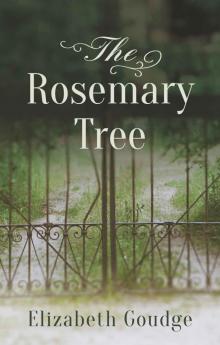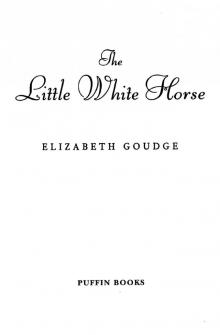- Home
- Elizabeth Goudge
Pilgrim's Inn Page 2
Pilgrim's Inn Read online
Page 2
The sketch had been faintly colored, probably from memory when John Adair had been in his studio again, and gave to this man smooth pale gold hair, blue eyes, a fine, tanned skin, a finely shaped head, and perfect features. John Adair, to whom conventional beauty was an exasperation, had conceded this much grudgingly, as though he regretted it, and then had drawn with vigor and pleasure all that was individual in the face: the hard bones showing almost savagely through the taut skin; the hollowed temples; the dark stains beneath the eyes, with their curious look of vacancy that contrasted so oddly with the keenness of the rest of the face; the obstinate line of the jaw; the suggestion of bitterness about the mouth with its lines of endurance. It was a young face with the youth of it crossed out, as it were, by the lines slashed mercilessly by John Adair’s pencil across the broad low forehead and from the nose to the bitter mouth, and the beauty of it marred by the stains beneath the eyes and the tautness of the skin. The head stood out in startling fairness against a strange background, the background of a wood with the shapes of queer beasts and birds just discernible among the trees. It was like the landscape of a dream, and it had the vagueness of a dream that is half forgotten upon waking. At first Sally had scarcely noticed this background, but when she did notice it she looked at it long and attentively with an odd feeling of familiarity.
Then she looked again at the portrait and a sudden rage took possession of her. She was sure her father had not been fair. He must dislike this man, for he had cruelly accentuated the obstinacy, the bitterness, the—how was she to put it?—threadbare look of the face. And then, looking again, she was not so sure about the cruelty. This was not only a portrait of D.E., whoever he might be; it was a portrait of many men whom she knew. That was how countless men had gone through the war, men of thought and sensitiveness to whom the whole damnable business was almost unendurable, with just that almost savage obstinacy that a little dog shows when he is getting the worst of it in a senseless dogfight but means to hold on till the end, men so tired that their eyes looked at you as though they were sleepwalkers who did not see you at all, men who were bitter and sick of heart because now that the thing was over it did not seem to have accomplished much. So there was a patient angel waiting not only behind each person but behind each type of person, thought Sally, and so behind each of us two angels, and the beating of the years hammered out the future not only of oneself but of something more than oneself. You suffered not only for yourself, but for all the people who shared your kind of temperament, and your courage redeemed them as their courage redeemed you. . . . And perhaps old houses had their angel, created through the years by the people who lived there . . . and nations . . . and . . .
“Fool!” said Sally suddenly and ferociously to herself, and flushed scarlet to the roots of her copper-colored hair. It was wonderful what high falutin theories about suffering one could formulate when one did not happen to be suffering oneself.
Far away in the flat, miles away it sounded, the door of the cupboard where the Hoover was kept slammed meaningly, and then the kitchen door slammed. Mrs. Smith’s eleven o’clock snack was long overdue. Without looking at it again Sally put the drawing back in the portfolio, and the portfolio in its accustomed place, and returned to her duties.
— 3 —
Mrs. Smith comfortably established with a pot of steaming hot tea and a rock bun, Sally put on her white woolly coat, took her shopping basket, got into the lift, sailed down to the street, and sallied forth to the greengrocer’s. The heavenly beauty of the spring day sent her mercurial spirits soaring upward, and she sang softly as she walked along the street, swinging her basket. The beautiful old houses about her seemed lovely as the houses in a fairy tale, their windows and brass knockers winking in the sun, their roofs and weather-worn stones revealing unexpected colors in the bright clear light. Fragile clouds like puffs of white smoke fled across the blue sky before the wind, and she could hear the crying of the gulls down by the river. There was something to be said for London on a day like this. At first, after her open-air life on the hills, she had found it hard to be cooped up in London, but she was getting acclimatized now. Yet she wished they had a cottage in the country, especially now that the lease of their flat had only a few more months to run and they could not renew it. It might not be easy to find another home; they might, as her father suggested, have to “take a good long holiday somewhere,” and the holidays in the exceedingly expensive hotels which her father preferred were not much to her taste. John Adair had little liking for the simple life; he said it was not simple, but the most damnably complicated method of wasting time that had ever existed. He liked a constant supply of hot water, a refrigerator, an elevator, an electric toaster, a telephone beside his bed, central heating and electric fires, and anything whatever that reduced the time spent upon the practical side of living to a minimum and left him free to paint.
But Sally did not want to be set free for anything, for it was living itself that she enjoyed. She liked lighting a real fire of logs and fir cones, and toasting bread on an old-fashioned toaster. And she liked the lovely curve of an old staircase and the fun of running up and down it. And she vastly preferred writing a letter and walking with it to the post to using the telephone and hearing with horror her voice committing itself to things she would never have dreamed of doing if she’d had the time to think. “It’s my stupid brain,” she said to herself. “I like the leisurely things, and taking my time about them. That’s partly why I like children so much, I think. They’re never in a hurry to get on to something else.” But in spite of her dislike of hurry she quickened her pace. It was always round about eleven that the five children and the Pekinese were in the greengrocer’s shop. She was late this morning and if she did not hurry she would miss them.
Her luck was good today. They were not in the shop when she arrived, and she took as long as she could buying lettuce and rhubarb for lunch, a glorious bunch of flame-colored tulips for the dining room, a bundle of asparagus as a gift for Mrs. Rutherford because she had selfishly made too much noise in the bathroom this morning, and a bunch of violets for she did not know whom because they looked so lovely, a mass of them all together in a great basket, and she could not resist them. She bought everything at the most exorbitant price and with a pang of shame because so few people nowadays could afford to buy asparagus and tulips and violets. She spent a long time stowing it all away in her basket, still hopefully waiting, and then just as she turned to go they arrived.
The Pekinese, as always, arrived first, a little roundabout assertive young thing with exquisite snow-white fur, wearing a scarlet harness attached to a scarlet lead upon which she panted and strained in a state of bustle and hurry that seemed chronic with her. Attached to the other end of the lead were the twins, aged about five. They were beautiful children, and Sally, whose acquaintance with five-year-olds was not as yet intimate, would have given all she possessed to have them for her own. They both had dark softly curling hair, the little girl’s cut as short as her brother’s, dark eyes, and small yet strong bodies. The boy was the sturdier of the two, with red cheeks, eyes flashing with extreme wickedness, and an impudent grin. The little girl had only a faint rose color in her cheeks, but her eyes were just as wicked. They always wore the most enchanting clothes: jerseys of honey color, jade, or cherry; the girl in kilted skirts and the boy in knickerbockers of nut brown or turquoise blue; and some loving and careful person had always seemed to look them over very carefully before starting out, for there was never a button undone or a hint of anything showing that should not show.
Sally guessed that this loving and careful person was their older sister. She always came just behind them, her small face a little anxious, her gray-green eyes squinting a little in an effort to keep the twins and the Pekinese all in focus together. Once, when Sally had asked her age, she had whispered that she was twelve, but she did not look as much. She was small, thin, and freckled, with straight, fair, bobbed hair cut
in an old-fashioned fringe across her forehead. She was not pretty, but she had a delicate precision and charm that were very captivating. In her pastel-colored frocks she was like some fragile flower, a sweet pea or a wild anemone. Sally had the feeling that she was beset by many fears but was not in the habit of mentioning them, at least not in the presence of the brother next to her in age, who would certainly have laughed at them. . . .
Of all the children Sally liked this brother least. He was in his middle teens, tall and dark and amazingly handsome, rosy-cheeked and bright-eyed like his little brother, so brimful of laughter and vitality that his presence struck one like a blow in the face. Sally was sure that what he wanted in life, that he would get. He would be jolly and kind to those who did not oppose him, but ruthless to those who did. But he would not know that he was being ruthless. He would never know enough about other people to guess what would hurt them and what would not. He was brave and honest, generous and affectionate, but he had very few sensitivities.
The same could not be said of the elder brother: he looked a bundle of them. He was tall, thin, and bony, with a sallow skin and lusterless dark hair. At first sight one thought the younger brother had stolen all the beauty and left him none at all, but when one looked again one was not so sure. Movement transformed him. When he stood still his angular body appeared to have little grace, yet when he walked it had an almost fluid loveliness. And when his quick sudden smile touched his thin lips and his shy fawn’s eyes lit up with delight, his face was alive as very few faces ever are, almost shining with that deep-welling life that is tapped by so very few. . . . Sally hoped almost with desperation that things would not be too hard for him. . . .
John Adair had an amusing habit of planting people in their appropriate centuries, and Sally had caught it from him. She had no difficulty with those three. The girl had strayed from a page of Kate Greenaway, the handsome boy had sailed with Drake upon his piratical expeditions and firmly refused to be browbeaten by him, but the elder had come to this place and this time from a much earlier age—from the age of chivalry. The very first moment Sally had set eyes on this boy she had been reminded of some picture she had seen somewhere, the picture of a young chevalier attired in silk and fur with a hunting horn slung over his shoulder, and riding a white horse through a dark wood. It was a strange wood full of mysterious shapes of beasts, bears and dogs and deer. Up at the top of the picture, with a glorious disregard of perspective, was a lake or river with swans upon it. The young knight had pulled his beautiful horse to a standstill and was gazing with rapt and reverent attention at something which he saw. . . . With a sudden sense of shock Sally realized today that the background of the remembered but unidentified picture that she always set behind the figure of this boy was much the same as the one her father had set behind the head of the young man in the sketch in the portfolio. . . . They must both of them have been remembering the same picture.
Her purchases completed, she stood watching the children make theirs, smiling at them and receiving their answering smiles. Though she saw them almost daily on holidays she had never yet asked them where they lived or what their name was. In spite of her friendliness her innate humility made Sally reticent, and particularly so with those who most attracted her. She could not ask them questions or force herself upon them; it would have been a sort of sacrilege. Before loveliness that called forth her love she was reverent and shy, not taking, but asking wordlessly that she might be taken. The children, naturally, were unaware of her inhibitions. And they regarded her as a hoary grownup. Not as old as Mother, of course, but getting on.
That they loved, even worshiped, their mother was obvious. It was always “for Mother” that they seemed to be shopping. They chose with care the crispest lettuce for her, and they asked repeatedly, and generally in vain, if there wasn’t just one grapefruit for her. The eldest boy, whenever he had any money, seemed to spend it all on flowers for her, and he would look longingly at the grapes that only millionaires could buy. Today they bought lettuce, received with sorrow the customary information that grapefruit was said to be on its way but wasn’t in yet, and then, as they turned to go, their eyes were caught by the great basket of violets. They turned out their pockets, but there was nothing worth mentioning in them. The dead mouse in the little boy’s pocket and the skeleton of a rabbit’s head in the Pirate’s pocket were doubtless interesting relics, but of no commercial value. Even the eldest boy, who possessed a handsome pigskin purse, searched it in vain.
“You shouldn’t have got Mother that book on the ballet,” said the Pirate. “She wasn’t in the least interested.”
His tone was unconsciously brutal and the Chevalier flushed, not so much at his brother’s tone, Sally thought, as at the memory it invoked of his Mother’s lack of interest in what possibly interested him intensely. She dived into her basket and came forward quickly, the violets in her hands.
“Please will you take them to your mother,” she said. “I think I just bought them for the sake of buying them, because they were so lovely. I’d no reason to buy them.”
The quick delight of a fellow feeling rippled over the Chevalier’s face. . . . That was exactly what he was always doing himself, buying something just because it was beautiful, and then not knowing quite what to do with it when he’d got it. . . . Then he flushed again and gave her a stiff, awkward little bow. “I couldn’t take them,” he said gently. “You could wear them yourself. You could wear them on your coat.” And his eyes went appreciatively from the violets to her white coat and copper hair. He thought the copper and violet and white would be good together.
But at this point a long-legged child exploded suddenly from the back of the shop with great news.
“The bananas have come,” she said. “Dad’s unpacking ’em.”
“Then you’d better take yours along now,” said the lady of the shop to the children. “Two to each blue ration book, by rights, but never enough to go round really, so if you don’t they’ll all be gone in no time. Fetch ’em along, Vi. Tell Dad to give you ten for the young Eliots. They’ve not their books with them but it don’t matter.”
The Chevalier looked eagerly at Sally and flushed again, a tentative question forming itself upon his lips. It was one which he found it difficult to put to a lady with sufficient delicacy, but the Pirate crashed in with it like a breaker pounding a bottle on the beach.
“Are you overage for bananas? If you are, have some of ours.”
Sally’s remembrance of bananas was a faraway memory of rather nauseating scented soap, but she knew they would like her to accept. “Thank you,” she said. “Yes. I am overage for bananas, and I haven’t tasted one for seven years. I’d like one very much.”
“Oh, more than one,” pleaded the Chevalier.
“Three,” decided the Pirate. “One from each of us, not counting the twins. Better not dock the twins of bananas or there’ll be the hell of a row.”
“I’d rather just have one,” said Sally.
“Two,” said the Pirate, a master of compromise, and the bananas appearing at this point, he took them from Vi and dealt them around, one each to the Chevalier and Kate Greenaway, two each for Sally, himself, and the twins.
“Thank you very much,” said the Chevalier, as he took the violets. “Thank you. Mother will— Mary! Mary, stop it! Hi, Mary!”
Mary, the Pekinese, had perceived a mongrel over three times her size outside in the gutter. With a sudden wrench she jerked her lead out of the hands of the smaller twin, and hot with that hatred which the intolerant type of canine aristocrat feels for all lack of breeding, she dashed outside to make an end of it. The mongrel fled squealing, Mary after it, and the children after Mary. Sally was deserted.
Well, anyway, she thought, as she walked home, she knew their name now . . . Eliot. . . . And their mother, perhaps, would wear her violets. She wondered about their mother. She must be a very lovely woman to have such love
ly children, and queenly, for it seemed natural to them to bring her gifts. And perhaps hard to please, or they would not have been so careful over the choosing of her lettuces. But she could not be really motherly or she would not have hurt her eldest son by not being interested in the book he had given her. Unreasonably, acting upon surmise only, Sally felt that she did not like Mrs. Eliot.
— 4 —
The rest of the day continued to work out according to plan, and at six o’clock Sally found herself starting out for Jan Carruthers’ cocktail party in her new frock. She was much pre-occupied with it as she walked along. To save coupons she had made it herself out of a very fine gray wool material, soft and thin. It had a flared skirt that floated around her as she walked, and a soft crossover bodice that she hoped disguised the sturdy chest development which was the price she paid for her contralto singing voice. With it she wore a little short loose-swinging gray squirrel coat, and she had spent her very last coupons on gray silk stockings and gray suède shoes to match. Squinting from side to side she noted that the skirt flared out just as she had hoped it would, and looking at herself in shopwindows she was obliged to note that she looked very nice indeed. Yet she noted it with that familiar sinking of shame. . . . For the little fur coat had cost a pretty penny.

 The Rosemary Tree
The Rosemary Tree The Dean's Watch
The Dean's Watch Linnets and Valerians
Linnets and Valerians Gentian Hill
Gentian Hill B00DRI1ZYC EBOK
B00DRI1ZYC EBOK B008O6ZWTG EBOK
B008O6ZWTG EBOK The Scent of Water
The Scent of Water Pilgtim's Inn
Pilgtim's Inn Island Magic
Island Magic Pilgrim's Inn
Pilgrim's Inn Towers in the Mist
Towers in the Mist Green Dolphin Street
Green Dolphin Street The Bird in the Tree
The Bird in the Tree The Child From the Sea
The Child From the Sea My God and My All: The Life of Saint Francis of Assisi
My God and My All: The Life of Saint Francis of Assisi The Little White Horse
The Little White Horse My God and My All
My God and My All B00CKXCNH8 EBOK
B00CKXCNH8 EBOK